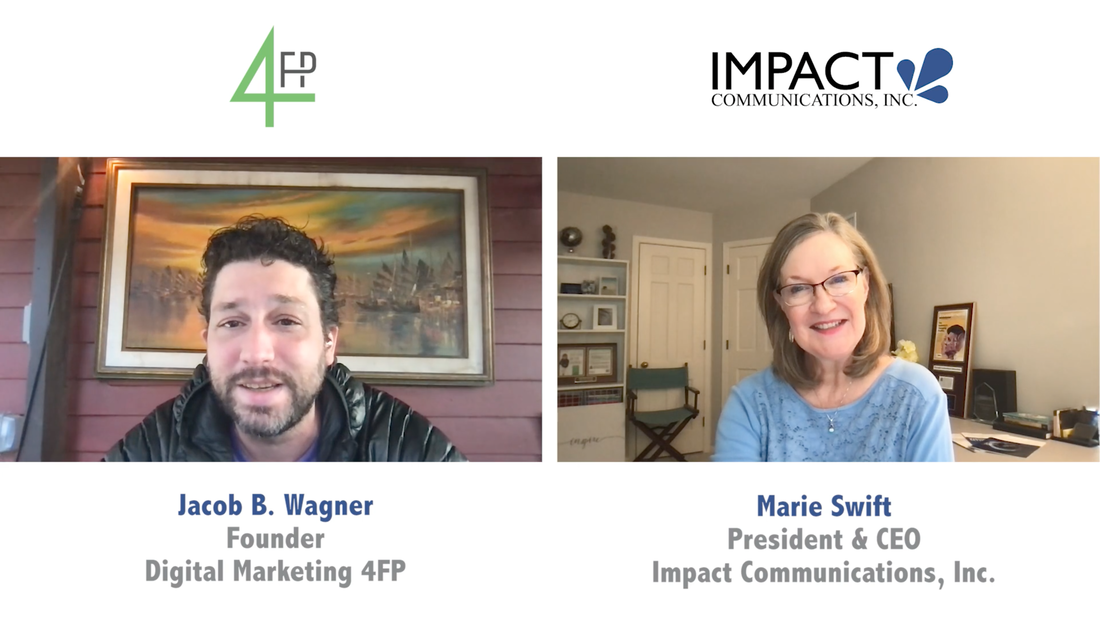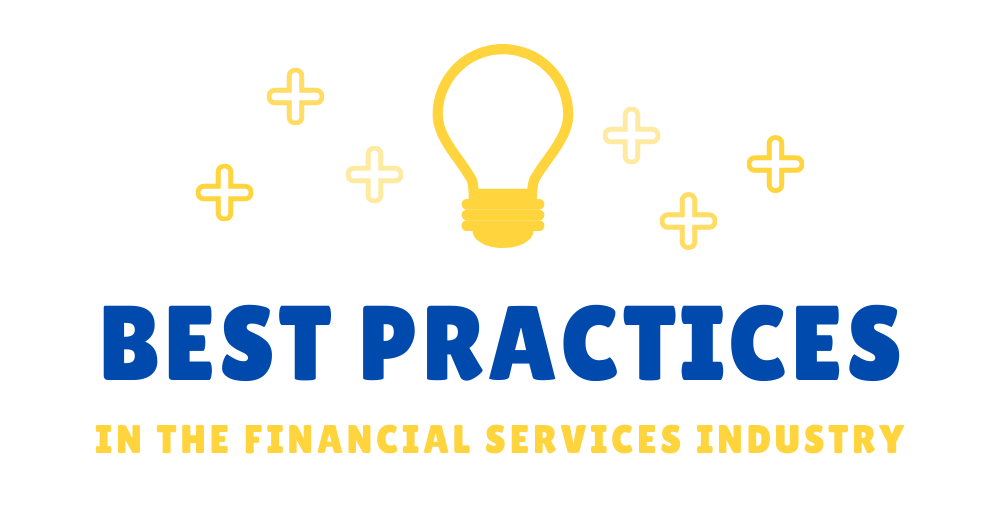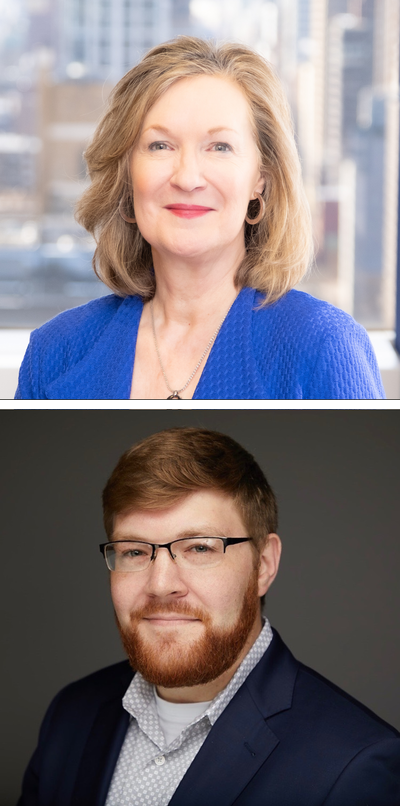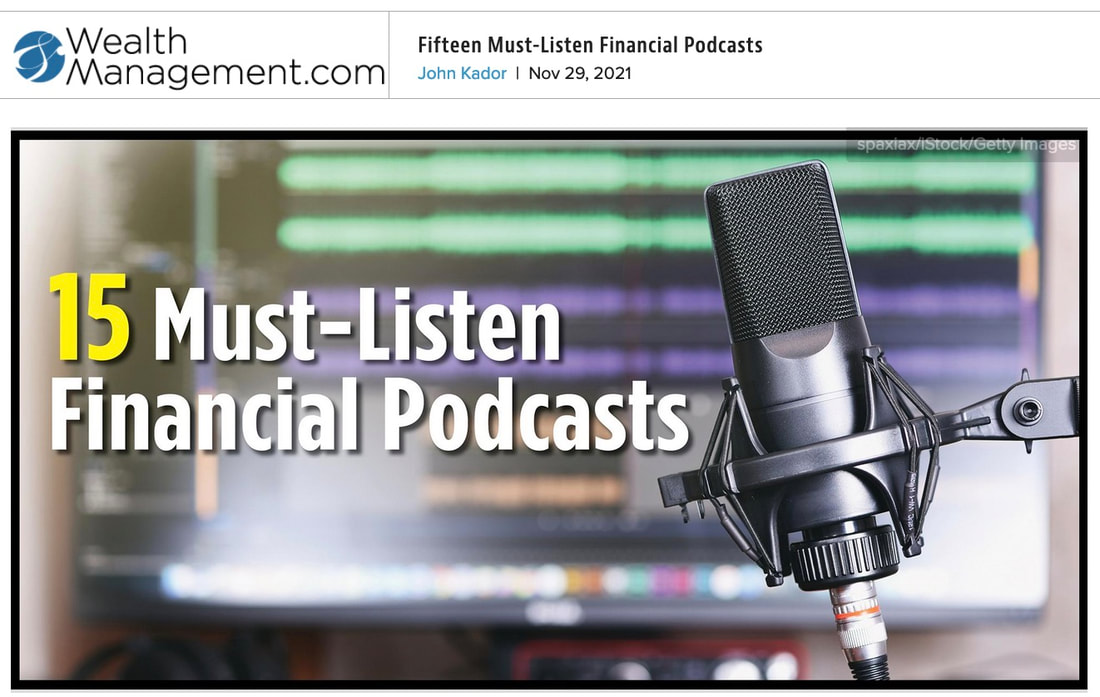|
In this Swift Chat video conversation, Marie Swift of Impact Communications, Inc. speaks with Jake Wagner, Founder of Digital Marketing 4FP, which offers creative marketing and fractional CMO services to fiduciary advisors and larger organizations that support independent advisors. The two talk about, what else, marketing and how smart advisors are adjusting their business growth sails in 2022.
To learn more about Jake and his firm, Digital Marketing 4FP, visit: www.DigitalMarketing4FP.com
To learn more about Marie and her PR and Marketing firm, Impact Communications, visit: www.ImpactCommunications.org For a full roster of Swift Chats, visit: www.impactcommunications.org/best-practices-blog/category/swift-chat How does the planner represent their brand image? What parts of themselves are they willing to put out online? That's why I call it your digital presence, because even if it's a referral, folks are still going out there and they're watching, they're going to check out your website, see what you've put out on social media. It's huge for being able to enable that trust." Transcript of Conversation
Marie Swift: Well, hello everybody. Welcome back to another Swift Chat. Today I am joined by Jake Wagner. Hey Jake, where are you? Up in the Northwest somewhere?
Jake Wagner: Portland, Oregon these days. It's actually not raining at the moment, but you know, there's still more time in the afternoon, so we'll have to see. It will probably get there. Swift: It looks like you're outside on your back deck. Wagner: This is what I like to call my outside office. It's a good level for everything, and it's really nice to get fresh air while I'm talking to clients. The Age of Authenticity Swift: Well, one of the blessings about going through the whole COVID crisis is I think people relax a little bit more about where you work and how you get work done, because even the corporate button-up types had to adjust with the times. I've been thinking a lot about how beneficial that is for us in this whole 'age of authenticity.' Where you can't be anybody other than who you are anyway. People really appreciate seeing the real human being. Maybe we could even just start at that because you and I are both fellow marketers and there's credibility, there's authenticity, there's digital... but this whole thing about power to the people-- here it is right here: a little piece of magic in our hands or these webcams and digital technology where we can really be seen as the people that we are with a little bit of character and culture. How do you think about that with your advisor clients? I know you also work as a marketing agency, about that whole 'being authentic.' Wagner: Well, a couple of things. One, I'm just realizing that that's a couple million dollars worth of resources that you just held up in front of the camera there with the smartphone. For a number of years, the tool that that has become is just absolutely amazing. If there's anything you want to add on, like maybe get a microphone. But there is just so much that you can do with a smartphone these days in so many different ways. One of the people I interviewed on my podcast recently, I was actually listening to him earlier today. I'm talking about just being able to show the back scenes, show what it's like backstage of different parts of your life and how that authenticity really brings an understanding of who somebody is. Also at the same time, it's pretty scary, too. How does the planner represent their brand image? What parts of themselves are they willing to put out online? That's why I call it your digital presence, because even if it's a referral, folks are still going out there and they're watching, they're going to check out your website, see what you've put out on social media. It's huge for being able to enable that trust. Swift: For sure. Every year, my team and I go up to Morningstar, to their investment conference-- well, every year except for one when we went virtual-- but we were back again this fall and we do this thing called The Social Digital Hub. We invite all of the advisors and attendees who are there to stop in and just play with our gadgets and gizmos and see how technology has democratized this opportunity to communicate. One of the things that we talk about every year, and I talked with Carolyn McClanahan, whom I'm sure you know, and Mark Tibergien, of course you know Mark. This year we talked about how much color is too much color. Do we really want to see that much of people or hear that much of their political philosophy? Carolyn McClanahan for instance says, "Hey, I am who I am. Everybody knows where I stand politically." How do you think about that for your own brand? Wagner: Well, I'll get back to my own brand, but even just two things... One on Carolyn, she's also sharing things about Monarch butterflies. There's nothing political about what it is that she's sharing. I think that's a part of what's so wonderful about it. Conversely, that other side that you talked about, I've got a lot of apprehension around. There has been a business convention for, time immemorial, of: you don't discuss politics or religion, over business. Now with Facebook connection, some of that stuff's happening. I've definitely seen some divides happen in communities, and it's sad. I'm wondering if there is a better way to do that. I think that's a part of what, as marketers, we're really striving to provide both for ourselves and for our clients. Because we want to show that, we want to provide value. We want it to be a gift of knowledge and possibly entertainment. We want it to be a positive impact that we're making in a person's life. Especially with the election cycle last year, watching some Facebook threads and that algorithm is not our friend, in this sort of a way. It absolutely, it multiplies... like the angry emoticon. That gets way more points than anything else, apparently they actually ranked it down because of this. Just getting people into it a little incensed war over stuff that we might not have brought up if it was another context. I think it's really important to understand what type of conversation we want to be using our social media platform to provide, and what kind of conversations do we want to facilitate. I think that's both in business and in personal. Swift: For sure. There was a lot of misinformation and "deep fakes" out there. I went to a TEDx talk here in Kansas City and it was amazing. The speakers showed how you could be fooled into thinking so-and-so said this, but it was an overdub. It's amazing. It's scary and it's weird, but this is the time we live in, right? I think that there's that middle ground where you and I like our clients to really live when it comes to being out there and building this online presence. So, maybe you could talk a little bit about how you help advisors at Digital Marketing 4FP, which is your website as well. Tell us what's new since last time you and talked. What's New at Digital Marketing 4FP Wagner: Well, since I had you on my podcast, we've actually changed a lot. At that point I was a solopreneur, and at this point I have a partner here in Portland and we have a back office that's based out of Tijuana, Mexico that does a lot of our build work. At the moment, we have an intern who just graduated from UNC Chapel Hill and she’s quite a bright talent that we've got there, and we're excited to have her. The digital marketing partnership, which has just really been foundational in the work that we've been able to provide to our clients. At one point, really what we were doing was more of like, I understand technology, I understand social media, so bringing a lot of that acumen together. Having a team that can build websites, do email marketing, place ads, all that kind of stuff. But what really brings it together is our fractional CMO work, where we come in and we actually optimize how your ideal client comes to you and understanding how to actually facilitate and make it more likely to have that ideal sales conversation, because you understand what it is that creates a "wow" factor with your clients and what gets them to help understand that your service is a must-have. Then getting to the point where what life events occurred in someone's life so that they understand that they might need your services. What opportunity can you give them? Maybe it's often on your website, maybe it's attending a webinar, but a way for them to raise their hand and say, "Hey, I'm actually ready to have this conversation and step forward." You can really take that model to every niche. There doesn't seem to be an end in the ability to really drive down to a niche. There's a wonderful InvestmentNews article this week about a guy here in Beaverton, one of the suburbs of Portland, who's fee-only practice is focusing on tattoo artists. You know, like, "huh, cool. Yes, please make sure that they get the financial advice that they need. That's great." that's where I see some of this really starting to serve the greater mission of the profession as well. Because really what we're doing is, when a planner understands what group of people they can serve the best and that they enjoy working with the most and focus and serve them then it makes it so the one planning practice versus another, you're not in competition. You're just trying to find the person for whom you are the right advisors for, and that's a very interesting process, too. Everyone is looking for a different need. Some people are really looking for something hourly, like the folks over at the Garrett Network. Some people really want to have a concierge level of wealth management. When you pick that it actually gives you more freedom to find the clients that you enjoy working with the most and can help the most. Swift: Yes, absolutely. Well, you and I are cut from the same cloth when it comes to that line of thinking. I like to talk about the three M's: your market and really understanding your market, then your message, and getting those two in sync, and then finally your methodologies or your mediums, that's the tactical stuff. So, you may see it a little bit differently, but it sounds like we're thinking the same way. It's really understanding those needs. Who you want to serve, who do you serve best and why, so that you can message to them. Then you can attract them through all these other strategic initiatives that you can undertake. So maybe you could give us some examples about how advisors have been successful in attracting the right kind of clients to their business. Wagner: Yes absolutely, so one, a client of ours out of the Nashville area and her old business partner was Republican and she is not. Just back to that conversation a few minutes ago that actually got them to have to have a business divorce. So, she was restarting her firm after 30 years. In these conversations, it was about, "well, who do you really want to help? Who do you really want to serve?" In Nashville, there's a very strong music theme and she knows a lot of those different folks. So that's actually who it is that we're now building up relationships with. It's even involved, quirky little things you wouldn't have thought of as good marketing ideas. We've actually made lighters with her logo as a little outreach to her ideal client, but if you get that out to a group of concert people, it'll start to circulate and it's a good way for someone to actually look you up and start to find you. It's been really nice and successful for her. Swift: I'm going to tell a quick story, and then if you have another one, tell another, because I think the stories sell, right? Facts tell, stories sell. That's the old story, the old adage anyway, but we've been telling stories since the beginning of, sitting around the campfire. I think that people can understand when they hear a success story. One of the advisors we're working with... we are big on credibility marketing and getting our folks into the press and getting them kudos and awards and making them look kind of larger than life. This advisor was doing great work, but nobody was shining a light on her. So she had a book, that book wasn't well publicized, but we kind of dusted it off and helped get that back out there to be more respectable, more visible at least. Then she had a second book, and we really went all out. It was right at the beginning of the COVID lockdowns, but we said, "let's go for it. Let's put the book out anyway. Maybe people have more time to read." We got some awards. We got a lot of press. Lo and behold, she was in competition with a big Wall Street firm and the amount of money that could be managed for this ultra-high net worth client was about 40 million. At the end of the day, the big New York firm lost the war against who was going to work with this affluent family. When this particular advisor said, 'what made the difference?' They said, "it's because you look like a rock star. If you're good enough to be seen in InvestmentNews and with these awards and quoted in Barron’s and do the research for this book and have your own author website, well you must be good. We think that we can trust you more because you're in a smaller firm. You manage 1.5 billion at your firm versus however many billions, at this New York firm." You don't always hear about those kinds of numbers when you're doing a marketing campaign or a PR campaign, like we were really focused on. But when you hear that, you think, "Hmm. I wonder how many other success stories can't be measured, right? Like that client attraction, where that overall online visibility made the difference, just reassured them, or even I'd say client retention through all the COVID mess. What would you add to that? The Finology Project Wagner: I'm not sure what I have to add to that actually, Marie, I think that was wonderful. I think the next thing I wanted to talk about with everybody was the "What is Finology?" project and even a little bit about, just to lead into it to keep the story part that you're talking about going, talk about how we actually manage our fractional CMO work and use the Finology Project as an example. So if you are not aware my, father was one of the people who was also the father of life planning, Dick Wagner, and he passed about five years ago and it's sad to see him go. There's a scholarship with the CFP board and the FPA and please definitely donate to that, but also, what he and I really wanted to see in the world and what we were working on when he passed was what we called the "What is Finology?" Project. Basically, you started to look at: one, it is about finding the human skills in money and understanding how we interact with this weird stuff of how we exchange value. Oftentimes this happens through things like dollars, and as a client purchases your services, but also, if you've been a parent-- I'm an uncle-- so I can only imagine on this, but somewhere in the middle of the night, the baby needs to get changed again. One of you goes to the other and you elbow them and say, "you owe me." What is that space? What is that contained in? Another way that Dad explained finology was that if you take four boxes and you put psychology in one top box and you put sociology in the box underneath that, and then if you put economics in the other lower box, both economics and sociology are about large numbers. Psychology is about individuals. How do we talk about an individual's relationship with money? He identifies this as a gap in our knowledge that we're now starting to explore. I can't run two businesses so basically, we treat the finology project as a client and it's gone through all of this "digital tune-up" is what we call the work, but where we actually are aligning, like, who is this you're attracting? How do you want to bring them to you? What is the best way for you to provide them value? Which is a really amazing thing. Then the other piece of news to share with that is, and we actually remade, like we did one value journey so that we're attracting folks to us through just work that we're putting out on social media and for our Patreon, but then we became CE vendors so now we've actually re-done all of that work. Even though it's the same ideal client, we're using a different journey that we're crafting with different places that they're finding us and stuff like that. We're going to actually have Susan Bradley and Gail Coleman and Thom Allison and Jennifer Laun, who are all amazing practitioners providing a full day workshop that when this episode is released, it's going to be in the past. So, it will have been on December 8th. Editor's note: Gayle Colman, CFP® (Somatic Finance), Thom Allison, CFP® (Lateral thinking), Jen Laun, CFP® (Giving and Receiving), Susan Bradley, CFP®, CeFT® (Financial Transitions) Now we're actually launching a whole new series through that client of having workshops and having attendees come, being a fee-only provider and just all the mechanics of that. It's been really great to see the results happen for this client. The XY Planning Network conference happened a couple of weeks ago and Michael Kitces said, he'd help us out and he has been, and we've got College Aid Pro and Simply Paraplanner and a bunch of other folks are coming in to support us as well. So, it's a little bit of that PR stuff that I learned from you, Marie, like bring in the cavalry and say, "Hey, let's get this big, unified message out through all of these fronts" and the folks are coming. So that's really cool. Swift: Well, congratulations on all that. You know, I loved your dad. I thought he was one of the most remarkable people on the planet. He left such a wonderful foundation for all of us to continue the work. I was looking at your email that you sent about the Finology Project in this great workshop that I wish this particular podcast was coming out in advance of, but there's no way we can get this out by December 8th, which is when your workshop is with all of the great practitioners. Wagner: There'll be another one. We'll have more in Q1 of 2022. Join us for those. Swift: Maybe there will be a replay of sorts that people can get access to for this one, but we're actually, you and I are recording this episode for Swift Chat on December 1st, 2021, the year has flown by. It felt like it was Groundhog Day every day for a while with this whole COVID mess like, oh, wish I could take a vacation, but I'm going to just create one in my mind and enjoy that pot roast or the tofu stir fry or whatever it is that we were inventing at home to keep it fun, game night, right? One thing caught my eye when I was reading this email about the Finology Project, and maybe you could comment on this is seeking the humanity in money. I mean, isn't that what money is supposed to be all about? Wagner: Theoretically, I mean, look at the word value, when we exchange dollars, that's exchanging value. Then we looked at our morals and the values of our lives, that word is used in both places for that reason. So yes, I do think that the way that we exchange value should represent our values. I think that's one of the issues that we're facing today. Also, we all have very different ways that we understand what money is. It was only my undergraduate thesis, but I did do my thesis on people's perceptions of money and their money habits and how that related their perceptions of wealth. Everybody... it's like a fingerprint, like we all understand this stuff in very different ways in the way that we see it. We all think that we're talking about the same thing, and that's why this is such a big deal, because we've been doing this stuff for thousands of years, but so much of it is still subconscious. When we can pull that out into the light and when we can give it language, then we can start to understand how some of this stuff works for us. Maybe we can also find a better way to do it too. Swift: Well, we've gone about 20 minutes and I call these Swift Chats for a reason because I want to keep them kind of short and add value for our community. I like to even think of it, almost like a tribe. My tribe tends to be the independent advisor on the high-end fiduciary spectrum. I believe yours is too, but with the last little minute or so that we've got, is there anything that you'd like to leave our listeners and our viewers with today? Wagner: One of the ways that we introduce ourselves to our audience is through something called "Challenges," and we actually have a Challenge to help you find your ideal client. It's the IdealClientChallenge.com and that's the place where you can sign up and you can also link back and see our schedule. We put those on about once a quarter right now, we also have one about style. If you'd like to learn more about the agency, just go to 4FP.co and that'll redirect you to the rest of our site. We would love to have you join us for the conversation about what we discovered Finology to be. That's why it's a question is that we don't have answers for some, but we need your support, and we need you in a part of the conversation to help us discover what money really means to us and what it really means to humanity. You can find more about that at WhatIsFinology.org. Swift: All right. Very cool. Well, Jake, it's always great to see you and speak with you. I hope I'll get to see you in person in 2022. Wagner: Me too. Looking forward to it. It's been too long. Swift: Well, stay well, my friend and hope to see you soon. Wagner: Thank you for the opportunity to chat. This has been wonderful. Comments are closed.
|
About
|
|
Stay Connected
|
Phone: 913-649-5009
©2023 Impact Communications, Inc.
|





